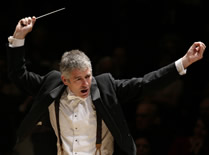When Thelonious Sphere “T.S.” Monk III told his dad he wanted to play the drums, he was already 15 years old. “You’re late,” his father, the jazz piano legend Thelonious Monk Jr., told him. But, Monk Jr. decided, if T.S. was going to learn to play the drums, his father was going to make sure that he was going to do it right. Immediately, Monk called up drummer Max Roach: “The kid wants to play the drums,” he told him. “I’m sending him to your house…,” and he hung up.
T.S. joked and reminisced about his life as a musician and the son of a musical genius at the Bechtler Museum of Modern Art‘s monthly jazz concert on March 1. T.S. was accompanied by the Ziad Jazz Quartet, the Bechtler’s resident jazz band. Naturally, the group played the music of Monk, including his standards “Ruby My Dear,” “Rhythm-a-ning,” and “Epistrophy.” In between, T.S. took the microphone. Through his stories and playing, he tugged at the timeline of history, bringing the audience face to face with icons of jazz.
Growing up as the son of Thelonious Monk Jr. was like growing up in jazz Olympus. The Monk household was a frequent stop of jazz gods like John Coltrane, Art Blakey, and Coleman Hawkins. Miles Davis would often knock on the door and come in before Monk was even awake to wait patiently on the piano bench for a lesson.
Although surrounded by fame and genius, T.S. says there was no pressure on him by his father to become a musician. In fact, for five years after he started playing drums, his father never said a word to him about practicing or even how he was coming along. It was after those five years that Monk one day walked past his son on the way into his bedroom and said something like, “You ready?,” without even looking at him. Supposedly T.S. said yes, because soon after, he was on national television playing with his father’s band.
T.S. told stories like these about his father’s unexpected and spontaneous ways – the characteristic and almost stereotype of the elder Monk’s music. But T.S. didn’t just want people to remember his father as the musical genius who ‘played the wrong notes’ and shaped the genre into what it is today. T.S. made it clear that Monk’s character was just as important as his music. “He was a real good father to me and my sister,” he iterated several times. “I was always on his mind, and I’m very grateful.”
T.S. said he thinks the reason his father never pressured him about his playing until he was ready was because his father wanted to make sure he really loved the music and the instrument. He wanted to make sure that his son wanted to pursue it on his own. This love was evident as T.S. smiled and danced when he played, and his solos and comping were playful and conversational. The influences of Roach were evident as well in his syncopated, dynamic, and melodic phrases that didn’t attempt to show off or shut others up. His playing swung and invited others to participate.
T.S., along with local musicians Chad Lawson on piano, Ron Brendle on bass, and Ziad Rabie on saxophone, stayed in the pocket (a jazz description about playing as a unit that is hard to explain, but you know it when you hear it). All four musicians are seasoned and mature, and their playing reflects it; without ego, they enjoyed themselves, each other, and the music. As a result, the audience did too.
Along with his childhood stories, T.S. also expressed a special connection to Charlotte that came from adult life. After the deaths of his sister, girlfriend, and father, all within a three-year period in the early 1980s, T.S. stopped playing. It was at West Charlotte High School, during a school demonstration led by the Thelonious Monk Institute of Jazz (which T.S. founded), that he decided to start playing again. His mentor, Roach, was with him and challenged him to a drum battle by setting up two drum sets opposite each other in the auditorium. After battling it out for a while, T.S. decided that, after six years, it was time.
Since then, T.S. has released almost ten albums and toured nationally and internationally. Most famous, perhaps, is his all-star 1998 album Monk on Monk, on which he plays the tunes of his father with the likes of Herbie Hancock, Wayne Shorter, Christian McBride, and Roy Hargrove, (to name a few).
Hearing about the life of T.S. Monk III (as well as T.S. Monk Jr.) through stories and music was moving in every sense of the word. I was always swaying and tapping my foot, and when he spoke about his father and the people he played with, it was like glimpsing into heaven. The memories of Miles and ‘Trane and Dizzy and Monk live through this man and this music, and now, having listened to a witness, I (and all of Friday’s audience) have become a witness too.











